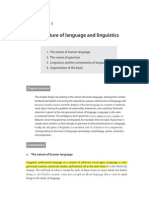Futur Proche
Futur Proche
Uploaded by
Stf L'bouclésCopyright:
Available Formats
Futur Proche
Futur Proche
Uploaded by
Stf L'bouclésOriginal Title
Copyright
Available Formats
Share this document
Did you find this document useful?
Is this content inappropriate?
Copyright:
Available Formats
Futur Proche
Futur Proche
Uploaded by
Stf L'bouclésCopyright:
Available Formats
July 7, 2010 Courtesy of Frenchtasticpeople.
com
Expressing Future Actions With the Futur Proche.
Bonjour dear Frenchtastic members!
Here is another useful language lesson brought to you by FrenchtasticPeople.com .
To express future actions in French, you can use two main methods. Of course, one of
them, quite simply, consists in using the futur simple tense. The second one, which is very
commonly-used among French speakers, is the Futur Proche, and this is what I am going to
show you today.
What is the futur proche (near future), anyway, and how is it different from the futur
simple?
To get a better of the futur proche in French, simply think about the grammatical
construction to be going to + verb in English.
Examples:
- She is going to wash the dishes. Elle va laver les assiettes.
- We are going to watch a movie tonight. Nous allons regarder un film ce soir.
The main difference between the futur proche and the futur simple is that with the former, you
can express actions in the future that are about to happen in a “relatively short period of time”.
But what does a “relatively short period of time” really mean? Well, it’s hard to determine. At
times, I will use the futur proche to express actions that are to occur the following year, such as
in “Je vais aller en France l’année prochaine” and I can also use the futur simple to describe actions
that will occur any second from now, but neither use seems to be incorrect in a spoken
conversation.
How to form the futur proche?
As you can see from the above examples, to express future actions with the futur proche,
you must use the verb aller (to go), in the simple present, followed directly by a verb in the
infinitive* form, for example, manger, danser, prendre, venir, etc.
(*I will assume here that you are pretty familiar with the infinitive form, but if you aren’t feel
free to shoot me an email at prof_moderator@frenchtasticpeople.com and I’ll explain it to you).
Formula: Futur Proche
Subject + Aller (conjuguated in the simple present) + verb (in the infinitive form).
{Aller} in the simple present tense:
Je vais | Tu vas | Il/Elle va | Nous allons | Vous allez | Ils/Elles vont.
You can find the audio files for this verb at frenchtasticpeople.com
In the meantime, why don’t you solve this little exercise?
Translation from English (or your own language) into French and vice versa.
1. Marcel va diner au restaurant ce soir.
2. Les enfants vont jouer dans le parc ce week-end.
3. We are going to learn French this summer.
4. Are you going to study today? (Use the inversion method to ask a question. Email me if in trouble )
You might also like
- French Unit 1 Tricolore 1Document5 pagesFrench Unit 1 Tricolore 1muskaan.kukrejaNo ratings yet
- Collins Easy Learning French Grammar (Gnv64)Document162 pagesCollins Easy Learning French Grammar (Gnv64)Alexandra Bostina98% (55)
- 8 Page Aqa Gcse French Studio Grammar Translation WorkbookDocument8 pages8 Page Aqa Gcse French Studio Grammar Translation WorkbookCaroline CooperNo ratings yet
- Nolasco and Saclot Transitivity in PH Type LanguagesDocument25 pagesNolasco and Saclot Transitivity in PH Type LanguagesFeed Back ParNo ratings yet
- Guidelines For A Food Piece of WritingDocument4 pagesGuidelines For A Food Piece of Writingapi-319907833100% (3)
- French Unit 4 The WeatherDocument62 pagesFrench Unit 4 The WeatherMs. N. WhitehallNo ratings yet
- Panorama 1Document5 pagesPanorama 1api-251795046No ratings yet
- The Top 100 Common Usage ProblemsDocument4 pagesThe Top 100 Common Usage ProblemsJayvee Puntalba Calinog100% (2)
- Practice 6Document24 pagesPractice 67almoooh83% (6)
- Lesson Plan Ma Famille 1110Document2 pagesLesson Plan Ma Famille 1110MonaNo ratings yet
- Le Futur SimpleDocument3 pagesLe Futur SimpleElouise FourieNo ratings yet
- Ma Routine QuotidienneDocument2 pagesMa Routine Quotidienneapi-508167920No ratings yet
- Devoir FalloirDocument2 pagesDevoir Falloirfatma9903No ratings yet
- XI STD French Language Combined 14.06.2018hjDocument108 pagesXI STD French Language Combined 14.06.2018hjRavi Kumar100% (1)
- Structure Vocabulary For IELTS EssaysDocument5 pagesStructure Vocabulary For IELTS EssaysJahanzaib KhanNo ratings yet
- Pronom y NotesDocument2 pagesPronom y Notesshiza100% (1)
- Les VerbesDocument7 pagesLes VerbesNanditha A100% (1)
- Speaking - FrenchDocument32 pagesSpeaking - FrenchphanikrishnaakellaNo ratings yet
- Course Syllabus French Abinitio 2019-2021Document12 pagesCourse Syllabus French Abinitio 2019-2021Ilakshi TalwarNo ratings yet
- 0478 m17 Ms 22Document5 pages0478 m17 Ms 22M.Hassan Bin AdeelNo ratings yet
- Familles Recomposées: Ça Marche Pour Vous ?: Student's Name: Subject Group: French (Language MYP Year: 3 (Phase 1)Document4 pagesFamilles Recomposées: Ça Marche Pour Vous ?: Student's Name: Subject Group: French (Language MYP Year: 3 (Phase 1)synixNo ratings yet
- Si Clauses French "If - Then" ClausesDocument10 pagesSi Clauses French "If - Then" ClausesNicoleta FaurarNo ratings yet
- Depuis X Il y ADocument3 pagesDepuis X Il y ABeatriz MedeirosNo ratings yet
- RE Verbs ConjugationDocument10 pagesRE Verbs ConjugationdivyaNo ratings yet
- Révisions de Français Années 7, Examen de Juin: Year 7 Work "Tricolore Total 2"Document14 pagesRévisions de Français Années 7, Examen de Juin: Year 7 Work "Tricolore Total 2"Mona100% (2)
- A1 Grammar QuizDocument3 pagesA1 Grammar QuizkrashidNo ratings yet
- What Is L'impératif?: Present Tense Subject PronounsDocument4 pagesWhat Is L'impératif?: Present Tense Subject PronounsNeelma MisraNo ratings yet
- Panorama 6 Mon Paradis Sur Terre Soda Unit La Terre en DangerDocument5 pagesPanorama 6 Mon Paradis Sur Terre Soda Unit La Terre en Dangerapi-251795046No ratings yet
- French Ab Writing Sample QuestionsDocument106 pagesFrench Ab Writing Sample QuestionsIlakshi TalwarNo ratings yet
- L'impératif (Imperative)Document3 pagesL'impératif (Imperative)riya100% (1)
- GCSE French Foundation Vocabulary WorksheetDocument2 pagesGCSE French Foundation Vocabulary Worksheetamal100% (1)
- French B GuideDocument4 pagesFrench B GuideMoitheri HaneseNo ratings yet
- 0520 s19 QP 11Document12 pages0520 s19 QP 11AditiNo ratings yet
- IGCSE FrenchDocument2 pagesIGCSE FrenchAmira BabaganaNo ratings yet
- Les Couleurs Year 7Document22 pagesLes Couleurs Year 7Jean grebeNo ratings yet
- French 2 WFD10201: Me You Him / Her / One Us You ThemDocument2 pagesFrench 2 WFD10201: Me You Him / Her / One Us You ThemEmyza Amirah100% (1)
- ICSE Priya KathuriaDocument7 pagesICSE Priya KathuriaKumarNo ratings yet
- How To Use Possessive Pronouns in FrenchDocument11 pagesHow To Use Possessive Pronouns in FrenchdattarupamNo ratings yet
- CBSE Class 9 French Question Paper SA1 2012Document6 pagesCBSE Class 9 French Question Paper SA1 2012Jabez JeenaNo ratings yet
- French Reading Practice - Free Interactive TextsDocument24 pagesFrench Reading Practice - Free Interactive Textsglen4uNo ratings yet
- GCE French Units 1 2 3 ND 4Document30 pagesGCE French Units 1 2 3 ND 4karaouilaid0% (1)
- Les PronomsDocument4 pagesLes Pronomsapi-299513272No ratings yet
- French 8 Grammar PDFDocument11 pagesFrench 8 Grammar PDFaokiwe002No ratings yet
- Le Pronom DemonstratifDocument16 pagesLe Pronom DemonstratifDiya SinghNo ratings yet
- Registration Form DELF DALFDocument2 pagesRegistration Form DELF DALFhealth with wealthNo ratings yet
- French B SL NEW Written Assignment CriteriaDocument2 pagesFrench B SL NEW Written Assignment CriteriaPhilippe Cosentino100% (1)
- French ArticlesDocument2 pagesFrench Articlesapi-299513272No ratings yet
- Ab Initio Course OutlineDocument4 pagesAb Initio Course OutlineHema KoppikarNo ratings yet
- Imperative in FrenchDocument1 pageImperative in Frenchalexandre aleNo ratings yet
- Les adjectifs-BANGSDocument11 pagesLes adjectifs-BANGSAngelina Khb100% (1)
- Comparative and Superlatives Lessons PDFDocument38 pagesComparative and Superlatives Lessons PDFAlcides Déss Harry DerroosNo ratings yet
- Delf A1Document4 pagesDelf A1Kinjal MehtaNo ratings yet
- Participle Présent - GérondifDocument2 pagesParticiple Présent - GérondifDimitri KastaniasNo ratings yet
- Les Articles Contractés (À)Document6 pagesLes Articles Contractés (À)French Files100% (1)
- Dynamo 1 Module 4 WorksheetsDocument9 pagesDynamo 1 Module 4 Worksheetsadambenyounes2020100% (1)
- French 1 Unit 5 Les LoisirsDocument2 pagesFrench 1 Unit 5 Les LoisirsGabriela MccawleyNo ratings yet
- A1 French Study GuideDocument9 pagesA1 French Study Guidekrishna.bhattNo ratings yet
- What French Prepositions Go With Countries, ContinentsDocument7 pagesWhat French Prepositions Go With Countries, ContinentsloloNo ratings yet
- Alliance Francais French ContentDocument5 pagesAlliance Francais French ContentikeNo ratings yet
- French HandbookDocument31 pagesFrench HandbookShahroze AnsariNo ratings yet
- La ComparaisonDocument1 pageLa ComparaisonRanvithaNo ratings yet
- Marie Has a Party! / La fête de Marie! / The Language of Food, Family and Friends / Le langage de la nourriture, de la famille et des amisFrom EverandMarie Has a Party! / La fête de Marie! / The Language of Food, Family and Friends / Le langage de la nourriture, de la famille et des amisRating: 5 out of 5 stars5/5 (1)
- French Speaking Activities (KS3): Fun Ways to Get KS3 Pupils to Talk to Each Other in FrenchFrom EverandFrench Speaking Activities (KS3): Fun Ways to Get KS3 Pupils to Talk to Each Other in FrenchRating: 5 out of 5 stars5/5 (2)
- Figures of Speech ExerciseDocument6 pagesFigures of Speech ExerciseVanaja Chillara100% (1)
- Reading Guides English Grammar I - 2022Document15 pagesReading Guides English Grammar I - 2022Facundo GarayNo ratings yet
- Positive: Negative: QuestionsDocument2 pagesPositive: Negative: QuestionsMiguelEguiluzNo ratings yet
- Eton Latin GrammarDocument282 pagesEton Latin GrammarDecimusL100% (1)
- Quiz English XIDocument3 pagesQuiz English XINovi Mirzah RachmawatiNo ratings yet
- Vocabulary For Primary School Level 2: J.Sisc+ Bi SR BeluranDocument10 pagesVocabulary For Primary School Level 2: J.Sisc+ Bi SR Beluranarvindraj874No ratings yet
- A2 - Grammar BankDocument17 pagesA2 - Grammar BankOsiris Nguyen100% (1)
- Solutions To Grammar ExecisesDocument76 pagesSolutions To Grammar ExecisesBrysonNo ratings yet
- Sentence, Clauses and PhrasesDocument6 pagesSentence, Clauses and PhrasesCarolina Urgilés BustamanteNo ratings yet
- English Writing GrammerDocument46 pagesEnglish Writing GrammerNaep LoaeNo ratings yet
- 9.c1.1 - Unit 9 - GrammarDocument8 pages9.c1.1 - Unit 9 - GrammarMarta PuigaNo ratings yet
- Academic LanguageDocument42 pagesAcademic LanguageJules Gajes50% (2)
- Lesson 5: THE Proposition: By: Sir Ivan AbalosDocument23 pagesLesson 5: THE Proposition: By: Sir Ivan AbalosEdrian UpaoNo ratings yet
- Dalrymple NikolaevaDocument263 pagesDalrymple Nikolaevaxdboy2006No ratings yet
- Slide Adjective-Adverb & ArticlesDocument107 pagesSlide Adjective-Adverb & ArticlesMd. Saiful Islam SagorNo ratings yet
- Language Forms and Functions - Ebook Chapter 1Document49 pagesLanguage Forms and Functions - Ebook Chapter 1Harry ChicaNo ratings yet
- Parts of SpeechDocument12 pagesParts of Speechreema alturaifNo ratings yet
- Comparative Adjectives Words That End in y PDFDocument2 pagesComparative Adjectives Words That End in y PDFAndrea ChirinosNo ratings yet
- Equative, Comparative & Superlative AdjectivesDocument20 pagesEquative, Comparative & Superlative AdjectivesLeidy Cristina Hurtado100% (1)
- Online Class IX - Word FormationDocument13 pagesOnline Class IX - Word FormationSetiawan Putra Syah M.SiNo ratings yet
- Cases in FinnishDocument6 pagesCases in FinnishGina Contillo50% (2)
- PKBK3073 English Language Teaching Methodology For Pupils With Learning DifficultiesDocument26 pagesPKBK3073 English Language Teaching Methodology For Pupils With Learning Difficultieswan amirahNo ratings yet
- EquivalenceDocument6 pagesEquivalenceBasit khanNo ratings yet
- Reported Speech PDFDocument3 pagesReported Speech PDFTeresa Peteiro CereijoNo ratings yet
- Amin Nur Hidayati & Dian Kusuma Suci (Taken From Various Sources)Document13 pagesAmin Nur Hidayati & Dian Kusuma Suci (Taken From Various Sources)Kusuma WardaniNo ratings yet
- BSE 2005-31 (063-072) TkatchukDocument10 pagesBSE 2005-31 (063-072) TkatchukАлёна ТарневаяNo ratings yet

























































































